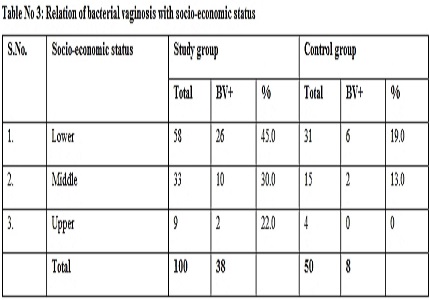Role of bacterial vaginosis in preterm labor - a prospective study
Abstract
Objective: To study the incidence of bacterial vaginosis in pregnant women in preterm labor and in labor at term and the relation of bacterial vaginosis with preterm delivery, neonatal birth weight and puerperal sepsis.
Material and Methods: This prospective case control study included 150 pregnant women. 100 pregnant women with singleton pregnancy between 28 to 36 weeks of pregnancy with preterm labor pains were selected randomly in study group and 50 pregnant women in labor at term ( >37 weeks) were enrolled in control group. Diagnosis of bacterial vaginosis was made by clinical criteria (Amsel’s criteria). The two groups were compared in regard to the presence of bacterial vaginosis. Pregnancy outcome variables assessed included gestational age at delivery, neonatal birth weight and puerperal sepsis.
Results: In study group 38% women, while in the control group 16% women had bacterial vaginosis. This difference is statistically highly significant. ( p < .001). Out of 30 women with bacterial vaginosis in study group, 27 (90%) women delivered before 37 completed weeks, while only 10% delivered at term. Bacterial vaginosis was associated with low birth weight and was significantly associated with puerperal sepsis.
Conclusion: Bacterial vaginosis in pregnancy is associated with adverse pregnancy outcomes including preterm labor, preterm delivery, low birth weight and puerperal sepsis. Thus screening for bacterial vaginosis in all pregnant women complaining of vaginal discharge and also in all patients with preterm labour is justifiable.
Downloads
References
2. Witkin SS. The vaginal microbiome, vaginal anti-microbial defence mechanisms and the clinical challenge of reducing infection related preterm birth. BJOG. 2015 Jan;122 (2) :213-218.
3. Goldenberg RL,Culhane JF, Iams JD, Romero R. Epidemiology and causes of preterm birth. Lancet.2008 Jan; 371(9606):75-84. [PubMed]
4. Hillier SL, Nugent RP, Eschenbach DA, et al. Association between bacterial vaginosis and preterm delivery of a low birth weight infant. N Engl J Med. 1995 Dec 28; 333(26):1737-42. [PubMed]
5. Kurki T, Sivonen A, Renkonen OV, Savia E, Ylikorkala O. Bacterial vaginosis in early pregnancy and pregnancy outcome. Obstet Gynecol. 1992 Aug; 80(2):173-177. [PubMed]
6. Leitich H, Bodner-Adler B, Brunbauer M, Kaider A, Egarter C, Husselein P. Bacterial vaginosis as a risk factor for preterm delivery: a meta-analysis. Am J Obstet Gynecol. 2003 Jul; 189 (1):139-147. [PubMed]
7. McGregor JA, French JI. Bacterial vaginosis in pregnancy. Obstet Gynecol Survey. 2000 May; 55(5):1-19. [PubMed]
8. Holzman C, Leventhal JM, Qiu H, Jones MN, Wang J,et al. Factors linked to bacterial vaginosis in nonpregnant women. Am J Public Health. 2001Oct; 91(10):1664-70. [PubMed]
9. Amsel R, Totten PA, Spiegel CA, Chen KC, Eschenbach D, Holmes KK . Nonspecific vaginitis: Diagnostic criteria and microbial and epidemiologic associations. Am J Med. 1983;74 (1):14-22.
10. Goldenberg RL, Hauth JC, Andrews WW. Intrauterine infection and preterm delivery. N Engl J Med. 2000 May; 342: 1500-7. [PubMed]
11. Spong CY. Prediction and prevention of recurrent and spontaneous preterm birth. Obstet Gynecol 2007 Aug; 110 (2); 405-415. [PubMed]
12. Moi H. Prevalence of bacterial vaginosis and its association with genital infections, inflammation and contraceptive methods in women attending sexually transmitted disease and primary health clinics. Int J STD AIDS.1990Mar; 1(2):86-94.
13. James DK, Weiner CP, Steer PJ, Gonik G. High Risk Pregnancy Management Options. Third edition. New Delhi: Elsevier; 2006.1299-1300 p.
14. Hay PE, Lamont RF, Taylor- Robinson D, Morgan DJ, Ison C, Pearson J. Abnormal bacterial colonization of the genital tract and subsequent preterm delivery and late miscarriage. BMJ 1994 Jan; 308 (6924):295-298.
15. McGregor JA, French JI, Jones W, Milligan K, McKinney PJ, PattersonE, et al. Bacterial vaginosis is associated with prematurity and vaginal fluid mucinase and sialidase: results of a controlled trial of topical clindamycin cream. Am j Obstet Gynecol. 1994 Apr; 170 (4):1048-59.
16. Gratacos E, Figueras F, Barranco M, Vila J, Cararach V, Alonso P, et al. Spontaneous recovery of bacterial vaginosis during pregnancy is not associated with an improved perinatal outcome. Acta Obstet Gynecol Scand. 1998; 77(1):37-40. [PubMed]
17. Purwar M, Ughade S, Bhagat B, Agarwal V, Kulkarni H. Bacterial vaginosis in early pregnancy and adverse pregnancy outcome. J Obstet Gynecol Res. 2001 Aug ; 27 (4): 175-181. [PubMed]
18. Donders GG, Van Calsteren K, Bellen G, Reybrouck R, Bosch TV, Riphagen I, et al. Predictive value for preterm birth of abnormal vaginal flora, bacterial vaginosis and aerobic vaginitis during first trimester of pregnancy.BJOG.2009 Sep;116(10):1315-1324.
19. Gravett MG, Nelson HP, DeRouen T, Critchlow C, Eschenbach DA, Holmes KK. Independent associations of bacterial vaginosis and Chlamydia trachomatis infection with adverse pregnancy outcome. JAMA. 1986 Oct; 256(14):1899-1903.
20. E Holst, A R Goffeng and B Andersch. Bacterial vaginosis and vaginal microorganisms in idiopathic preterm labor and associated with pregnancy outcome. J clin microbial. 1994 Jan; 32(1):176-186.
21. Rodrigo Pauperio Soares de Camargo, Jose A S, Jose G C, Valeria M N, Sebastian F. Impact of treatment of bacterial vaginosis on prematurity among Brazilian pregnant women: a retrospective study. Sao Paulo Med J. 2005May; 123(3):108-112.
22. Newton ER, Prihoda TJ, Gibbs RS. A clinical and microbiologic analysis of risk factors for puerperal endometritis. Obstet Gynecol. 1990 Mar; 75(3): 402-406.
23. Jacobson B, Pernevi P, Chidekel L, Platz- Christensen J. Bacterial vaginosis in early pregnancy may predispose for preterm birth and postpartum endometritis. Acta Obstet Gynecol Scand. 2002 Nov; 81(11):1006.



 OAI - Open Archives Initiative
OAI - Open Archives Initiative


